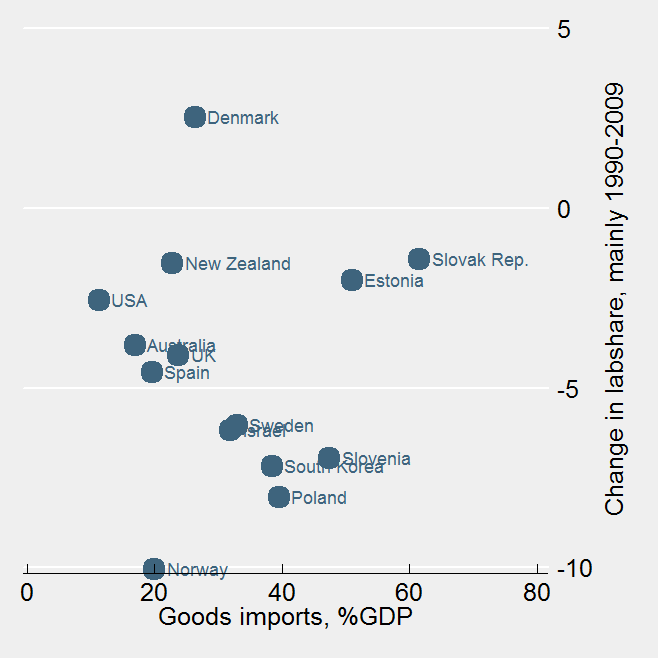The logic of this proposition seems pretty straightforward. In a world of tradable goods and services, wage competition is a lever against labour. Timothy Taylor points us to the recently released Economic Report of the President, which features a discussion on the falling labour share of income. In particular,
(In the United States,) the labor share has declined since 2000 in every major private industry except construction.
And, of course, construction is a key non-tradable sector.
The Economic Report of the President cites the OECD 2012 Employment Outlook, which discusses the declining labour share at length. In both cases, globalization is seen as one possible factor. But the empirical case is hard to make. In the scatter below, I show the change in labour share of income for OECD economies mentioned in the 2012 Employment Report, against the level of imports in 2009 (as a share of the economy).
 In his text on the “great doubling” (pdf) of the global workforce, Richard Freeman, the Harvard labor economist, wrote in 2006 that,
In his text on the “great doubling” (pdf) of the global workforce, Richard Freeman, the Harvard labor economist, wrote in 2006 that,The world has entered onto a long and epochal transition toward a single global economy and labor market. There is much to welcome in the new economic world but also much to fear. The country needs to develop new creative economic policies to assure that workers fare well during this transition and that the next several decades do not repeat the experience of the past twenty or thirty years in which nearly all of our productivity advance ended up in the pockets of so few.
What kind of policies will be embraced to make the next twenty years different from the past twenty years? On the whole, I’ve grown disillusioned at the notion that the super-rich have the nous to make sure everyone wins from globalization. They might just suffer from a collective action problem, or they might just not be that smart. But the longer our recessions drag on, the more I realise that enlightened self-interest won’t get us there.
Update: Here is Freeman’s longer essay (pdf) on the Great Doubling of the global labor force, with a special warning to highly-skilled workers. H/T Nancy Folbre.
Update Update: Andrew Berg and Jonathan Ostry at the IMF find that, “Over longer horizons, reduced inequality and sustained growth may be two sides of the same coin.”